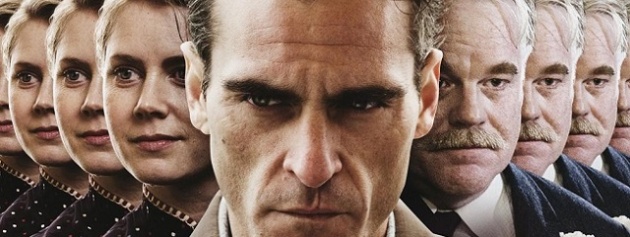
Freddie Quells (Joaquin Phoenix) is the textbook definition of a scoundrel. Contained on a vessel in the Pacific he could pass for normal, but only due to the distressed nature of war-time. His cocktails possess the kinds of contents that bootleggers would consider hazardous.
Following his naval tour, Freddie is a veteran who finds himself without a place. Jobs come in an erratic order and he finds himself out of them just as quickly. He looks as uneasy in the world physically as he is mentally. Perpetually hunched, Freddie makes everyone around him a little more uncomfortable. He has a convicts' eyes, constantly searching for exits.
When Freddie seeks a free ride boarding a yacht, he finds himself under the inquisitive gaze of Lancaster Dodd (Philip Seymour Hoffman). Dodd takes Freddie in, for what reason is unknown, but he sees something in the feral cat of a man that no one else does. In the interest of science, Dodd must know what makes Freddie tick.
Dodd is the leader of The Cause, a group dedicated to returning to the perfection in man by finding our flaws in our past. To his detractors, Dodd preys on the willing belief that his audience offers, much like a magician. He offers solutions in a life that has few following the second World War. Peggy (an increasingly varied Amy Adams) appears to be the steady hand behind Lancaster, but she is a driving force. Where he is weak, she pushes him, the movement must not fall prey to outsiders or critics.
Freddie presents a major road block to legitimacy in Peggy's mind. Especially when naysayers start appearing in door wells of Cause gatherings.
L. Ron Hubbard is a reference, but nothing Paul Thomas Anderson nor Hoffman offers is reverent to the actual man. The Cause's expansion is hinted at, but never fully acknowledged. And Freddie, well, his enigma will forever remain unsolved.
As perfectly rendered as every aspect of The Master is, the film's lack of emphasis on the story it tells is frustrating. Joaquin Phoenix and Philip Seymour Hoffman embody the id and ego relationship that makes them both so interesting to watch, but ultimately it feels like it didn't mean anything.
Paul Thomas Anderson has slowly transitioned the structure of his pictures from ensemble pieces to character studies replacing the inherently likable with cast-outs like Daniel Plainview and Freddie Quell. One man learning to obey his master, the other forced to roam the world without one.
Is it an evolutionary leftover that plagues man to place such faith in alpha members of society? Anyone with a polished image of themselves and a confident message can become a prophet. Placing your faith in the hands of these men is a dangerous game and one that rarely ends without displeasure.
One can only characterize watching The Master as holding a match, watching the embers slowly burn their way down to your fingers, but you don't care because you are entranced by it, you will pay for staring into the fire, but you don't know it yet. Eventually the light of The Master is gone and the only thing that remains is a burn of lingering questions.
Picture: The Master's theatrical released featured a 70mm print that hadn't been done since Kenneth Branagh's adaptation of Hamlet in 1996. Compressing the images down to Blu-ray format hasn't removed any of the sumptuous detail of the cinematography. The Master rivals the beauty of movie classics from the 50s.
Audio: Jonny Greenwood's score illustrates Freddie's split mind, but the mix subtly introduces it during key scenes as to not overshadow the dialogue. Soundtrack listings are similarly integrated without flaw.
Watch more videos at my WebTV channel.



